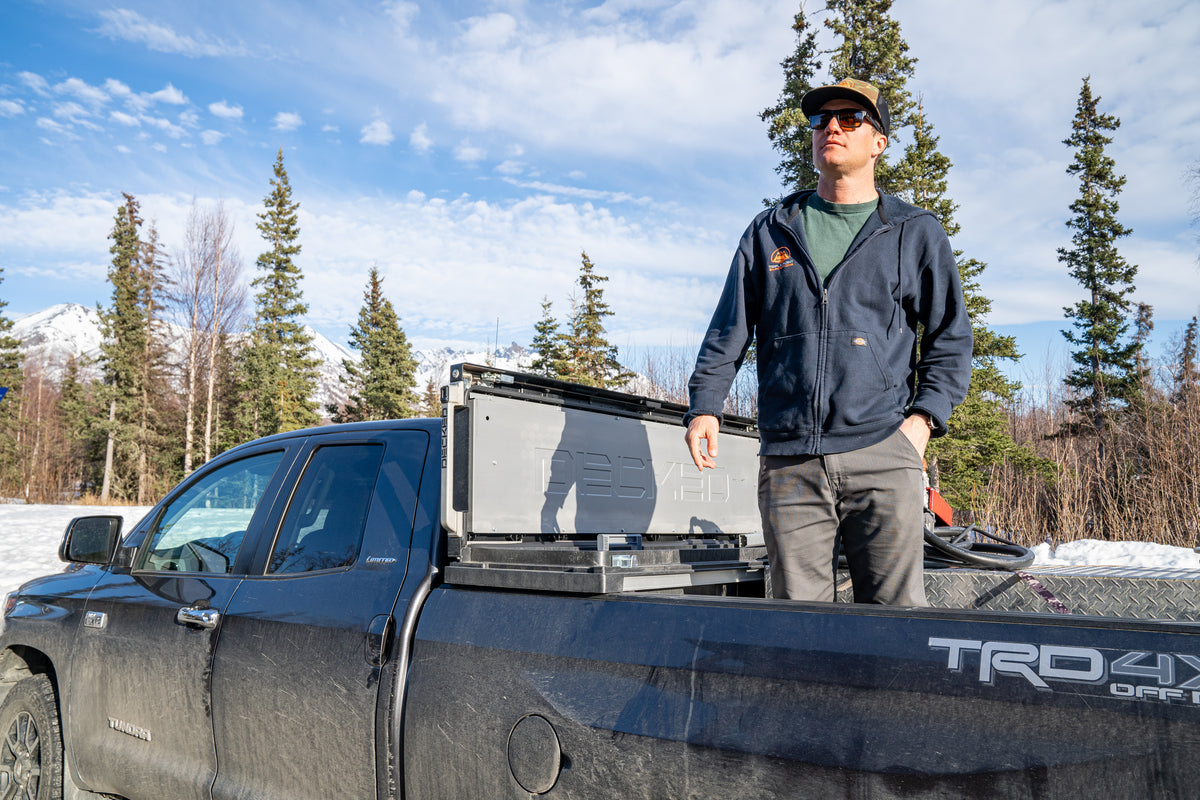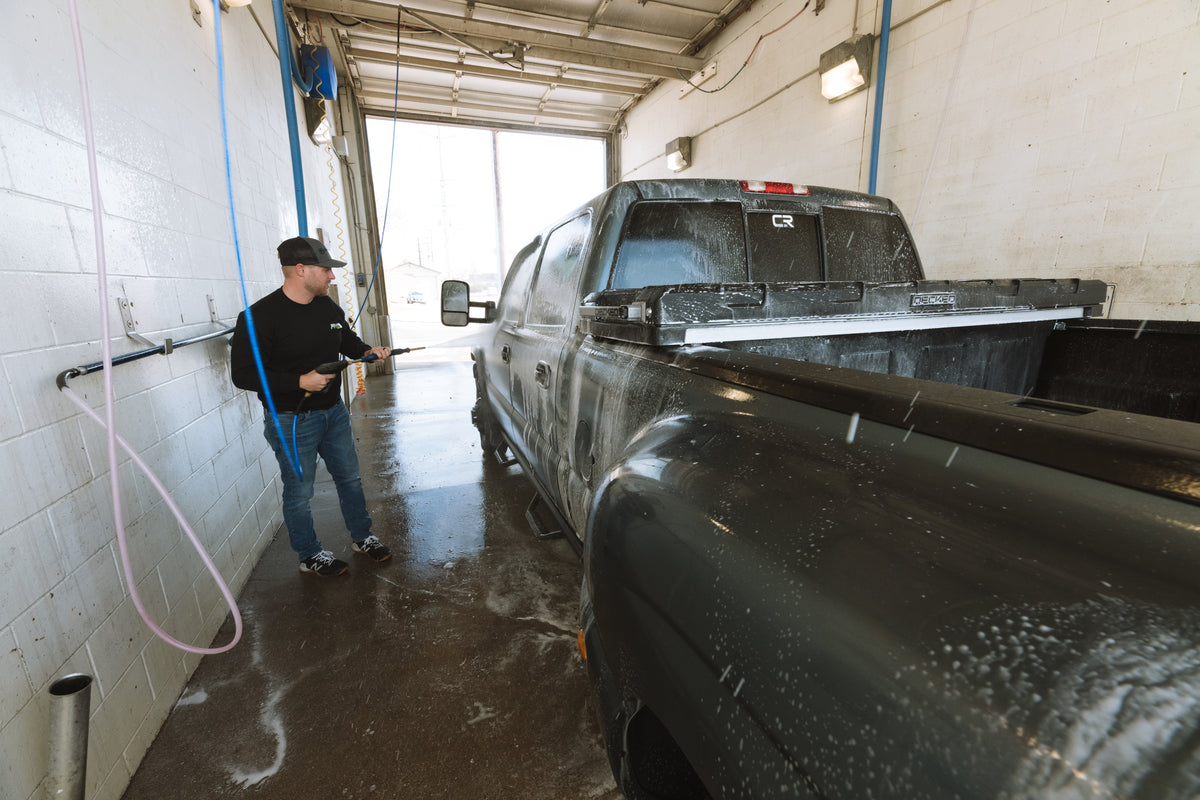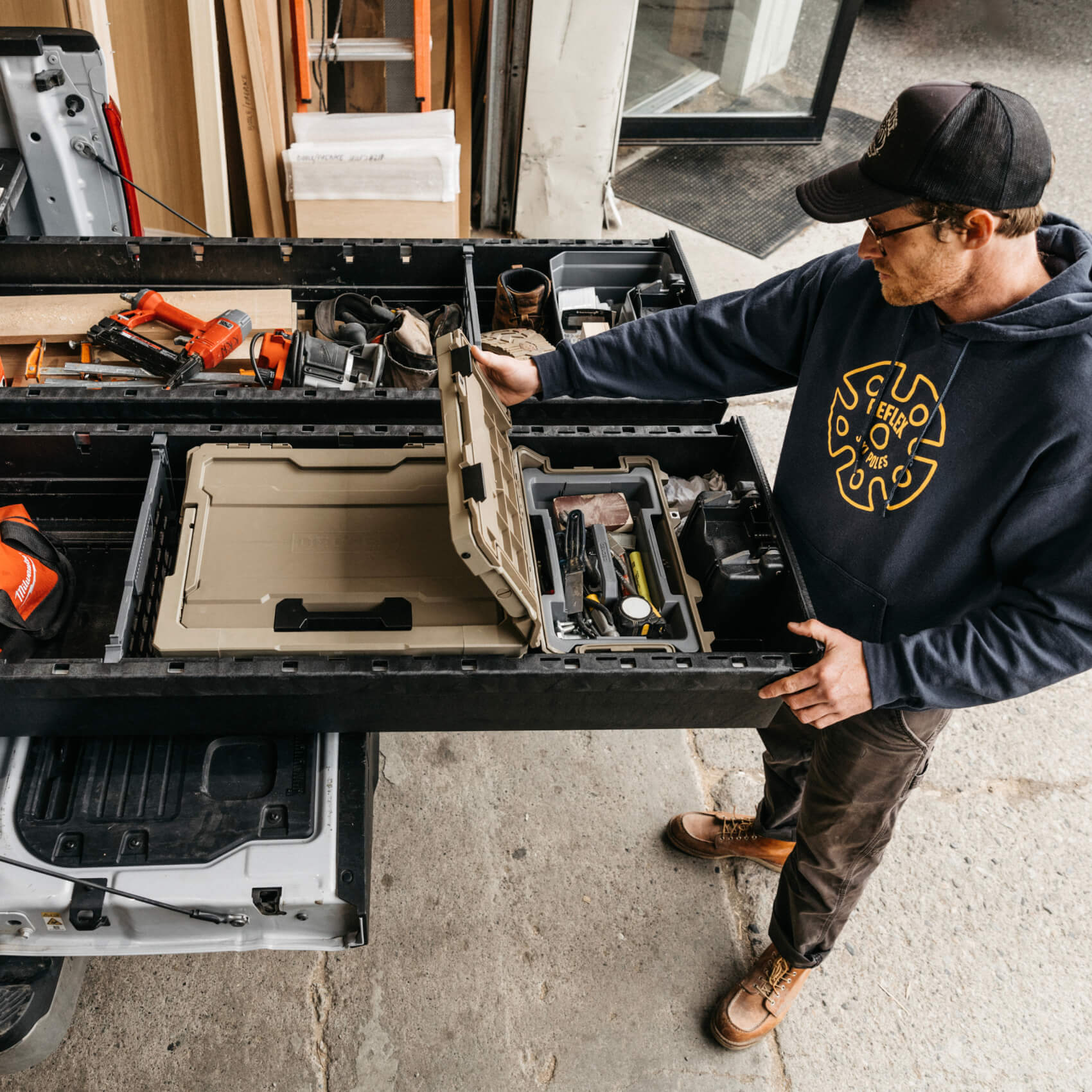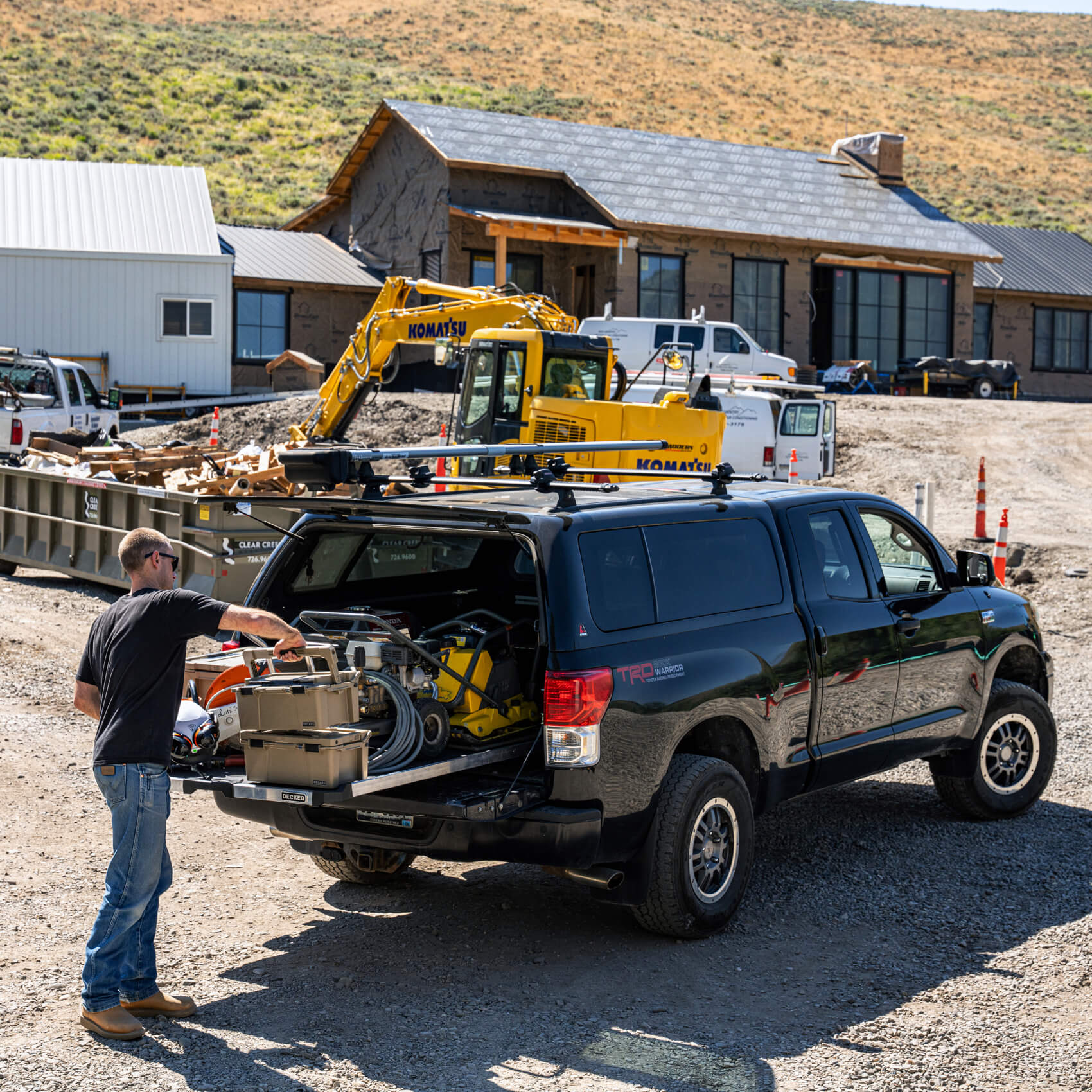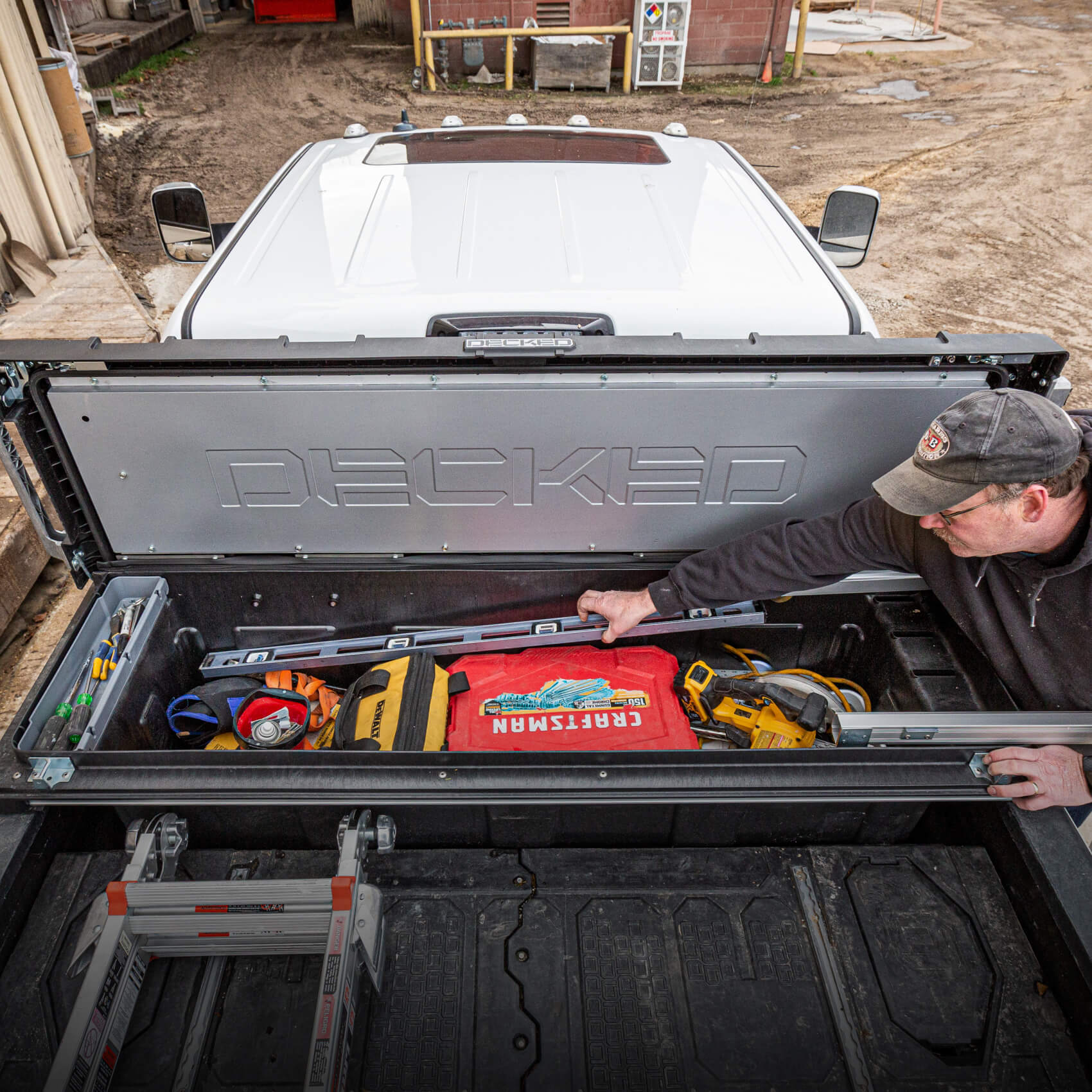Tool Box Talks: Features of a Good Tool Box and Care Tips
Toolboxes are important, irrespective of the type of tools you have. You need them to safely store your tools in an organized manner. However, you need to have appropriate knowledge to help you maximize your tool box. This is where tool box talks come in. Tool box talks help put you on the right track regarding tool box usage. They enlighten you on the best way to handle tools, which reduces the chances of work-related injuries, among many other benefits.
For comprehensive tool box talks, we will highlight features you need to consider when selecting a good tool box and provide you with tool box care tips.

Features of a Good Tool Box
As you know, the market is filled with a wide range of tool boxes, but not all of them are ideal. Tool box safety talks encourage you to have good quality toolboxes that help reduce accidents, but what makes a good tool box? At DECKED, we produce quality and functional tool boxes, thus we know exactly what makes an excellent tool box. Here are some of the features we believe a good tool box should have.
Adequate Security
A good tool box should provide adequate security. You wouldn't want to keep your valuable tools in a half-baked tool box that is easy to break into. We believe a good tool box should have robust latches, a reinforced lid, and beefy sidewalls at DECKED. Safety tool box talks also encourage you to get authentic toolboxes. This reduces your worries about possible theft and tool box breakage. Nobody wants a tool box that a thief can break into within minutes. Thus, DECKED gives you a reliable tool box that guarantees maximum security.
The DECKED tool box is made from materials from the future. No matter the efforts of a thief, breaking into this tool box is impossible. Therefore, you can be sure that your tools are safe at all times. However, what makes the DECKED tool box a sure bet when it comes to safety? We have designed our toolboxes with a strong focus on security. If you care about tool box safety, you know the importance of having a safe working environment. With the DECKED tool box, your safety is guaranteed.
We have made the tool box from materials that are safe for tools and yourself. Besides, the tool box is designed with a tub-lid interface that minimizes the pry bar points. Consequently, thieves won't find any weak spots to break into your tool box. Knowing the risk of thugs, our engineers also reinforced the tool box with steel that ensures stability and security. With this rigid structure, it would take significant efforts for anyone to access the tool box illegally.
Even more, the DECKED tool box has a robust armored locking system that prevents forced entry. No one can access this tool box without your permission. Therefore, you can have a peaceful night knowing your tools are safe!
All-Weather
A good tool box should protect your tools against all weather conditions. Generally, most toolboxes do a good job when it comes to preventing the entry of rainwater. However, does this mean that all toolboxes on the market are all-weather? No. Only the best toolboxes can guarantee you resistance to harsh weather conditions. Industrial tool box talks urge tool box users to be vigilant when purchasing a tool box since weather conditions change sporadically. Allowing water to enter into your tool box can cause significant damage. Thus, you need a reliable tool box that will keep them in good condition altogether.
Generally, a good tool box should have hinges and latches that guarantee tool safety, no matter the conditions. Choose a tool box with a high-quality stripping system that helps prevent snow and sand in adverse weather conditions. In simpler terms, we believe that a good tool box should be weatherproof. Don’t panic when it rains, or the climate gets tricky.
At DECKED, we know how valuable your tools are and the risk they face in adverse weather conditions. For instance, water entering your tool box could make the tools rusty, rendering them unusable. This could cause significant losses, especially if you spend a fortune on them. We wouldn't want you to go through such agony, and that's why we built the DECKED tool box that is reliable and weather-resistant. Besides, this tool box won't rust or corrode. Once you have sealed it, your tools are free from rusting and corrosion since we have designed the tool box to keep your tools completely dry.

The tool box runs off the water when it rains, directing it away from crucial areas. No matter how much it rains, all the tools inside the DECKED tool box will remain dry. The structural design of this tool box also gives it an added advantage. It is molded (not just welded). This gives you a reliable lid and seamless tube. There are no chances of water or air entry with this design, ensuring your tools remain dry.
Furthermore, once you seal the DECKED tool box with an EPDM gasket, it prevents entry of any particles. This means that the chances of your tools rusting when using the DECKED tool box are minimal. There is also a gasket and bub seal that directs water away from the tool box when it rains. By doing so, the chances of water accidentally dropping into the tool box while open are eliminated. The DECKED tool box, which is made from durable and compact material, also makes it an ideal option.
While this tool box has all the features preventing water entry, you need to be careful when handling it. Some general tool box talks warn against placing wet tools inside a tool box. This is risky because it increases the chances of rust and corrosion. You are encouraged to dry up your tools before placing them in the tool box. This helps improve your tool box durability.
Practical and Durable Material
A good tool box is made of durable materials. The strength and performance capabilities of a tool box rely heavily on its material. In most cases, toolboxes made of steel tend to offer security and stability. While any material could make a tool box, some are vulnerable to severe climatic conditions. For example, plastic toolboxes could develop patient scratches if you leave them in areas with salt spray. Such conditions could also increase cases of rust, especially if you have a metal tool box.
According to most construction tool box talks, an aluminum tool box will perform better in such conditions, given its rigidity. Aluminum toolboxes are common due to various unique features. For instance, they are lightweight, weighing around 50 lbs. This makes it easy to move when renovating your truck and other areas. It is also common to see plastic toolboxes, which some users prefer for various reasons. While plastic toolboxes might be convenient in some cases, they are not durable. It is also easy for a thief to break into a plastic tool box, making your tools vulnerable.
Therefore, you should get a reliable tool box made from durable materials. Perhaps, it is important to know some of the common materials used to make toolboxes and how they perform. Aluminum is by far the most reliable material when it comes to toolboxes. It offers a unique balance between durability and weight. Its lightweight makes it an ideal option, especially for users that regularly renovate their truck beds.
With a slightly higher strength-to-weight ratio, the aluminum tool box makes it easy to operate. At DECKED, aluminum is one of the primary materials we use to make toolboxes. This is because it doesn't allow water or other conditions that could lead to rusting. It is easy to love but impossible to dent. We have made it even better by improving its design and appearance. Therefore, it will look not only good but also durable.
Coated steel is another material used to make toolboxes. This is a good pick for your tool box because it is heavy-duty and durable. It has relatively rigid components that can strongly resist the impacts of adverse weather conditions. This helps protect your tools at all times. While steel is highly durable, its appearance could be compromised in extreme conditions — it can be scratched off when exposed to acidic conditions. This could leave your tool box looking rusty.
At DECKED, we have put in several measures to prevent such cases. We use galvanized and treated steel that doesn't rust or corrode. This helps keep your tools in excellent condition no matter the climatic conditions.
Convenience
A good tool box should also be convenient. OSHA tool box talks encourage you to use a convenient tool box that reduces the risk of injury. The market is flooded with a wide range of tools, but not all offer the convenience you need. It is challenging and frustrating to work with an incredibly difficult tool box to close and open. This way, you should consider convenience when getting a tool box.
At DECKED, we believe in toolboxes that are incredibly smooth to operate. If you come across a tool box that needs you to use a lot of energy to open or close it, it has a problem. Avoid using such toolboxes, no matter how reliable they seem to be. Mechanic tool box talks warn against using such toolboxes, given their risk. You could easily get injured handling such toolboxes.

Given the height of your truck, it may be hard to access the tool box. This is why we designed the Integrated Access Ladder that ensures easy access into your tool box. You can purchase this ladder separately, depending on your needs. This ladder is designed with precision, ensuring that it doesn't obstruct anything within the tool box. Thus, it protects you against some of the risks that come with accessing higher spaces. In addition, it gives you the stability you need when picking tools out of your tool box. Therefore, you should consider the convenience feature while getting a tool box.
Tool Box Care Tips To Help You Maximize Your Tool Box
Taking care of your tools is very important. A tool box might be durable in its original state, but how you handle it can significantly affect its durability. In daily tool box talks, you are encouraged to take good care of your tool box. So, what are some of the ways you can do this? Depending on your abilities, here are some tips you should consider to care for your tool box.
Clean Your Tools After Use
Tool box talk apps encourage you to clean your tools after every use. It is also a good idea to thoroughly wipe off dust and moisture from tools before keeping them in your tool box. Doing so prevents rust from forming on your tools. If you have dusty tools, you are encouraged to use a dry piece of cloth to clean them. There are cases where tools have grime or grease — get a good degreaser to help restore their condition.
You must avoid letting grease build up on your tool box because it can significantly affect the effectiveness of your tools. Also, irrespective of the material your tools are made of, you should avoid storing them in a water-logged tool box since it may slip into parts that are not water resistant.
Thanks to the DECKED tool box advanced features, it is easy to keep your tools clean. The tool box is made from galvanized steel that is resistant to rust. This material also helps prevent corrosion. Even though the DECKED tool box is versatile enough to prevent water and air entry, you should avoid keeping wet and greasy tools in it.
Such conditions trigger rusting and could significantly affect your tools. Besides, corrosion is also possible when the conditions are favorable. This is why it is vital to clean your tools after use. Water and moisture that trigger rust won't be available in enhanced conditions.
Organize Your Tools
According to short tool box talks, another effective way of caring for your tool box is keeping it organized. A well-organized tool box tends to last longer. Tool box organization also enhances the appearance of your tool box. You can imagine working with a tool box with tools scattered all over. This is not only disturbing but also increases the risk of injury. You could easily sustain a cut ransacking through a tool box with sharp objects.
This is why it is vital to keep your tool box organized. Doing so ensures that you have a clutter-free and productive workplace. Luckily, there are several ways you can organize your tool box. Perhaps, the best way to do so is by grouping tools in similar groups then placing them in unique areas. You also need a tool box that supports such an arrangement to achieve tool box organization. For instance, our DECKED tool box is designed to hold various sizes and shapes of tools. This makes it easy for you to organize your tools.

The tool box comes with unique features that promote neat arrangement. Generally, a tool box should have several drawers that are partitioned. The DECKED tool box has dividers that make it easy to arrange your tools without any confusion. It makes it easy to keep the small tools in a unique location while the larger ones take up their designated space. A well-organized tool box makes it easy to pick out tools. The risk of injuries will be significantly reduced.
Lubricate Your Wheels and Rollers
No matter the type of tool box you use, it has parts that require constant oil lubrication. Wheels and rollers are the common areas that need lubrication. As a regular tool box user, you know how important wheels and rollers are. Most tool box manufacturers encourage users to keep rollers in good condition because any damage to this part affects tool box efficiency.
You don't need specialized knowledge to lubricate wheelers and rollers. All you need is protective clothing and a spray. Carefully spray some oil into the joints to keep it going. Lubrication is highly encouraged because it maintains smooth tool box movement. Lubrication also prevents movable parts from rusting or corroding. If you notice that your tool box wheels are becoming stiff, lubricate them immediately. Those that use their toolboxes to move heavy tools are likely to notice changes in movement.
A poorly lubricated tool box needs lots of energy to pull, something that increases the risk of injury. At DECKED, we have high-quality toolboxes made from long-lasting material. However, they also need lubrication to avoid rigidity. The special technique used to make the rollers also encourages swift movement and easy maintenance. This goes a long way in making your work easier.
Remove Debris and Waste Off Your Tools Before Storage
If your work involves drilling wood and or walls, it is important to get the debris off your tools before placing them in your tool box. The presence of wood dust in a tool box can cause significant damage. For instance, it can accumulate on your tools and affect their performance.
Also, excessive presence of wood dust attracts destructive pests like termites. Imagine what hungry termites can do to your rubber tools. This is why you should wipe wood dust off your tools with a dry piece of cloth. Doing so will help improve your tool box durability and prevent cases of tool failure. This is why roofing tool box talks encourage you to clean your tool box after every usage.
Our DECKED tool box is designed to prevent dust entry when the tool box is closed. However, little can be done if you leave your tool box open. Leaving the tool box open in such circumstances increases wood dust accumulation risk. We encourage you to keep your tool box closed, especially when working in such circumstances. You should also avoid placing your tool box in the path of wood dust.
If wood, stone, or earth dust is being blown by the wind from a certain direction, avoid putting your tool box in its path. While dust poses a great risk to your tool box, it could be harmful to you. You can imagine how uncomfortable it is when dust particles enter your eye. Such cases could result in permanent eye damage. Therefore, adhere to daily tool box talks and keep dust off your tool box.
Do Not Overburden Your Tool Box
If you want to keep your tool box in excellent condition, don't overburden it. Every tool box has a limit on the maximum number of tools it can hold. Remember that this also applies to the top surface of your tool box — you shouldn't keep excessive tools here. Overburdening your tool box could affect its structural integrity.
Our DECKED tool box is designed to hold a significant size of tools given its dimensions. It has sufficient space to hold most of your work tools. While it can hold quite a number of your tools, you shouldn't abuse its capabilities. When a tool box is full and doesn't have space for more tools, find another place to keep them. Not doing so will weigh down your tool box and probably break it. Apart from weakening your tool box, overburdening it can cause dents. This is why you are discouraged from putting too many items in your tool box.
Keep Its Top Surface Clean
It is important to clean the top surface of your tool box. You can do so by dipping a piece of cloth into oil and wiping it clean. Cleaning the top surface of a tool box shouldn't be challenging. However, some toolboxes have wooden tops that make them difficult to clean. These surfaces soak in water and can be dangerous to your tools. They let in moisture that could lead to rusting. Besides, these surfaces could rot, exposing your tools. This is why you should get a reliable tool box with a rigid structure.
The DECKED tool box has a reliable metal top that is easy to clean and impossible to break into. Its hard solid surface also promotes easy access when operating the tool box. Thus, the chances of sustaining injuries while trying to operate your tool box are minimized.
Adhere To These Tool Box Talks To Maximize Your Tool Box Usage
Tool box talks enlighten you on the best way to care for your tool box. Better tool box practices make it more durable and reliable. Simple things like cleaning your tools before placing them in your tool box will prevent damage. At DECKED, we know what you need and have designed easy-to-use and maintain tool boxes. Get yours today.
